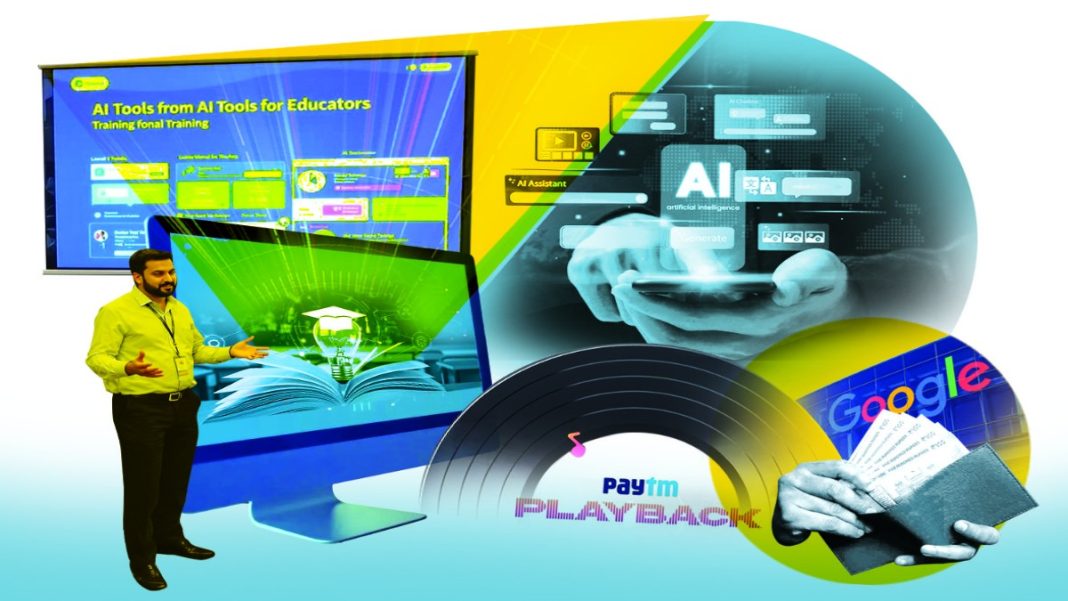AI Tracker: From Classrooms to Creativity
Artificial Intelligence is transforming multiple sectors across India and globally, with significant developments in education, entertainment, security, and entrepreneurship. This week’s AI tracker covers major announcements from Delhi’s education system, Paytm’s creative AI feature, Google’s security challenge, OpenAI’s new tools, ethical concerns raised by Robin Williams’ daughter, and a young Indian entrepreneur’s success in Silicon Valley.
Key Developments
- Delhi government announces AI training program for teachers
- Paytm launches India’s first AI-powered rap generator
- Google offers $30,000 rewards for finding AI vulnerabilities
- OpenAI releases AgentKit for building custom AI agents
- Zelda Williams criticizes AI recreation of her father Robin Williams
- 19-year-old Mumbai-born entrepreneur raises $3 million for AI ventures
Delhi Teachers to Receive AI Training
The Delhi government has launched an ambitious initiative to train teachers in Artificial Intelligence, aiming to transform traditional classrooms into technology-driven learning environments. This program will help educators integrate AI tools into lesson planning, assessments, and personalized learning experiences.
Teachers will learn to use AI-powered platforms for data-driven insights, enabling them to identify student learning patterns and improve educational outcomes. The training will also focus on digital literacy and the ethical use of AI in education, preparing students for future technology-driven careers.
Paytm Introduces AI-Powered Rap Experience
Paytm has unveiled Playback, India’s first AI-powered rap experience that blends creativity with advanced artificial intelligence. The feature uses generative AI to create personalized rap songs based on user prompts, combining voice synthesis, rhythm, and lyrical flow.
Users can input themes, emotions, or keywords, and Playback generates original rap verses tailored to their preferences. This innovation represents Paytm’s investment in AI-based customer experiences beyond its traditional finance and payments services, highlighting how AI can enhance self-expression and cultural creativity.
Google’s AI Security Challenge
Google has launched an AI Red Teaming Challenge, offering rewards of up to $30,000 (approximately ₹26 lakh) to individuals who can identify vulnerabilities in its AI systems. The initiative encourages ethical hackers, researchers, and developers to find flaws, biases, or security risks within Google’s AI models and safety frameworks.
This challenge is part of Google’s broader push for responsible AI deployment, emphasizing transparency, safety, and accountability. Participants are invited to stress-test AI tools, including generative models, to prevent misuse or harmful outcomes.
OpenAI’s AgentKit for Developers
OpenAI has introduced AgentKit, a comprehensive toolkit that enables developers to create, test, and deploy custom AI agents directly within their applications. The framework simplifies integrating autonomous agents with real-world functions like scheduling, data analysis, and online automation.
AgentKit provides APIs, libraries, and workflow tools to make building AI-driven assistants faster and more flexible. With built-in safeguards and policy alignment, the toolkit promotes responsible development of autonomous systems while democratizing AI development for creators, startups, and enterprises.
Ethical Concerns Over AI-Generated Content
Zelda Williams, daughter of the late actor and comedian Robin Williams, has publicly criticized the use of AI to recreate her father’s voice and likeness in digital videos. She described the trend as “disturbing,” arguing that such AI-generated imitations exploit her father’s legacy without consent or authenticity.
The use of deepfake technology to mimic celebrities has raised significant ethical concerns about identity, creativity, and privacy. Williams emphasized that while AI can preserve art, it should never replace the human soul and emotional nuance that defined real performances. This incident highlights the urgent need for ethical frameworks governing AI use in media, particularly when recreating deceased personalities.
ChatGPT Expands with Custom Apps
OpenAI has expanded ChatGPT’s capabilities by introducing Apps in ChatGPT and a dedicated Apps SDK (software development kit). This new feature allows developers and businesses to build, integrate, and run custom applications directly within ChatGPT’s conversational interface.
Users can interact with apps seamlessly for tasks like booking flights, analyzing data, or managing tasks without leaving the chat environment. This marks a significant shift from ChatGPT being a static assistant to a dynamic AI platform capable of executing real-world functions with built-in safety and data privacy standards.
Young Indian Entrepreneur Makes Waves
19-year-old Mumbai-born entrepreneur Dhravya Shah has raised $3 million in funding for his AI-driven ventures and earned the prestigious O-1 visa, granted by the US to individuals with extraordinary ability. His projects focus on building scalable technologies that enhance business efficiency and decision-making using AI.
Shah’s success exemplifies the rise of young Indian technologists making significant impacts in the international startup ecosystem. Beyond his ventures, he advocates for ethical AI use and open innovation while mentoring emerging founders worldwide, demonstrating how talent and responsible AI development can create globally recognized impact.




